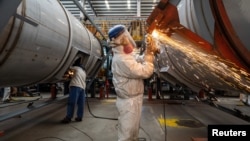In a swift response to China's decision to impose 84 percent tariffs on a wide range of US imports, President Donald Trump on April 9 announced that the United States will immediately raise tariffs on Chinese goods to 125 percent.
The move marks another escalation in a trade conflict between the world's two largest economies and sets the stage for what could become a prolonged economic standoff.
"Based on the lack of respect that China has shown to the World's Markets, I am hereby raising the Tariff charged to China by the United States of America to 125%, effective immediately," Trump declared on social media. "At some point, hopefully in the near future, China will realize that the days of ripping off the U.S.A., and other Countries, is no longer sustainable or acceptable.”
Treasury Secretary Scott Bessent insisted this had been Trump's strategy all along, telling reporters at the White House that Beijing has “shown themselves to the world as the bad actors.”
In an interview earlier on April 9 with Fox Business, Bessent condemned China's move, saying that it was unfortunate that the Chinese don't want to negotiate "because they are the worst offenders in the international trading system."
China's announcement of sweeping 84 percent tariffs on US imports initially sent shockwaves through global markets.
But the markets soared after Trump reversed his larger “reciprocal” tariffs on most of the world for 90 days in the face of recession fears.
Beijing's announcement of 84 percent tariffs came in response to Washington's 104 percent tariff on imports of Chinese goods. Beijing described the move as a defensive measure in response to what it called "persistent trade aggression" by the United States.
The United States imported $439 billion worth of goods from China last year with smartphones, laptops, lithium-ion batteries, games, and toys among the top items by value. The United States exported $144 billion worth of goods to China, leading to a trade deficit of $295 billion.
China's tariffs on US goods will come into force on April 10. Sectors targeted include American agricultural products, electronics, and industrial machinery -- key pillars of the US export economy.
"If the US insists on further escalating its economic and trade restrictions, China has the firm will and abundant means to take necessary countermeasures and fight to the end," China's Commerce Ministry wrote in a statement.
Wendong Zhang, a professor of applied economics and policy at Cornell University, said China cut its reliance on US goods, including agricultural products, following the previous trade war with the Trump administration in 2018-2019.
"This time around, Chinese leaders have the backing of a more supportive general public to stand up to the US and pivot to domestic consumption," Zhang said in e-mailed comments.
Trump's countermove included an overture to America's trading partners. He announced the 90-day pause on new tariffs for more than 75 countries that, he said, have been working constructively with US officials.
Fears over economic fallout from the tariffs had led to stock market collapses around the world. April 8 was the worst single-day fall since the Covid-19 pandemic in 2020.
Wall Street's benchmark S&P 500 lost more than 10 percent of its values in three days of trading, and Asian markets have also seen steep declines.
These sell-offs continued in the wake of China's announcement on April 9, with London's FTSE 100 index and Frankfurt's Dax both making large losses.
Investors are even selling US Treasury bonds, traditionally seen as a "safe haven" asset.
Paul Ashworth, an economist with the think tank Capital Economics, said that when the bond market began to weaken, it was only a matter of time before Trump folded on his high tariffs. During the 90-day pause all countries except China will have their reciprocal tariff rates set to the minimum 10 percent, he noted.
"Our working assumption now will be that, cowed by the market response, Trump will repeatedly extend the 'pause' meaning that this will end up looking a lot like the 10 percent universal tariff that he campaigned on," Ashworth said in a news release.
Trump has been unmoved by the market turmoil.
He has said his tariff policy is "medicine" and that he won't back down.
On April 8 Trump said partners were "dying" to negotiate new trade deals as a result of his trade measures.
"These countries are calling us up, kissing my ass," he told a Republican Party black-tie dinner.
The latest U.S.-China escalation occurred hours after European Union officials approved tariffs on approximately 21 billion euros ($23.2 billion) worth of U.S. goods in response to the 25 percent tariffs imposed by President Trump on the EU's steel and aluminum exports. On April 9, most of the EU's 27 member states voted in favor of the new tariffs, with some set to take effect on April 15.













